 |
|
 |
|
 |
 |
|
|
President's Musings
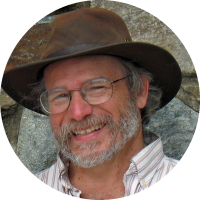
|
Ned Fielden |
Of course I am not referring to something your friendly family doctor might say, assuming you have health insurance, but the monetary squeeze experienced by higher education in general, and academic libraries in particular. Your own answer may vary. “My whole career!” shouts one of you in the back. Well, that may well be true, but perhaps your career is new, and then how would you know anything different? I remember myself entering the job market with my freshly minted MLIS in 1993 to another, perhaps less devastating, recession. Journal cancellations were then in force for most academic institutions, and I watched, a bit alarmed, as the first couple of my job stops slashed and burned their way through their journal budgets. Things got gradually better, with some ups and downs, then things got dramatically worse, and overall I am mostly struck by the larger patterns: as a rule states are less and less willing to fund their education programs, and while most lawmakers pay lip service to the value of a university degree, they do not generally actually do much to improve life for the university and its students, the present and future citizens. The latest budget from Sacramento indicates that the UC system, for the first time ever, will be accepting less money from the state for general fund operation than it gets through tuition (“fees” in the old terminology.) Crossing this Rubicon, while unfortunately not limited just to California, is an ominous and disastrous movement.
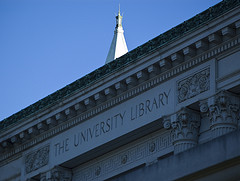
|
Doe Library, UC Berkeley
©
Ned Fielden |
What is a university education worth? A lot, by any metric. For many students it is a gateway to a career, a degree or credential that serves as an entry key to a profession, a means of livelihood. Even when that is the only goal, and universities since their very beginning have had as their primary mission the training of the advanced skills of reasoning and literacy to equip the state’s leaders and their supporting cast for running the apparatus of the church, government, and community life, a university education ends up having extra value. For most students, it winds up being more than professional training. A university emerges as a vast cognitive, cultural and social network that students barely understand or appreciate at first, and the values of an intellectual training do not disappear upon graduation. Basic courses refine communication skills and the core critical reasoning that make for an informed citizenry. Creative arts, just to pick one example, don’t just sweeten the mixture, they generate a huge economy of their own, and California’s vibrant film, art and music arenas benefit from graduates infused with healthy appreciations for and training in creative endeavors. A university is just about one of the most amazing things in the world: a place of learning, where students rub shoulders with those who make their living by hard, thorough thinking, it is a catalyst for change, a Pandora’s box of possibilities.
Librarians traditionally have had an ambiguous role in the academy. Some talk about the library being the “heart” of a campus, which tends to be more true in a small liberal arts setting, with education slanted towards the humanities, but can be true at large research universities as well. My eldest daughter, among many others, chose her undergraduate institution to at least some degree on the basis of its library. If not a heart to everyone, the library at all colleges and universities is at least is a pretty good set of kidneys. We do a tremendous job of filtering, cleansing the intellectual blood flow, and preserving the balance and health of our hosts. We put good stuff on the shelves. We battle with database vendors for the best resources at the least cost. We remove irrelevant and out of date material. We choose wisely. We keep the whole organism in good shape. We keep the intellectual blood clean so the liver (the provost?) can do its job. We may not always be visible, but we are indispensable, and unfortunately, not always noticed until dialysis is needed. Funding cannot drop below a certain “library living-wage” threshold, which many of us fear is approaching, before we no longer can operate properly.
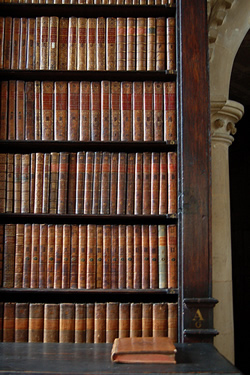
|
Bookcases in the Old Library,
St. Johns College, Cambridge
©
Ned Fielden
|
Justifying our work has become unfortunately more necessary than usual. At a library conference I attended in the UK last year, the keynote speaker was an educator, not a librarian, and spoke of the vital, pressing need for UK librarians to do the research necessary to justify their existence in an economic climate much worse even than ours. The tourniquet being applied to UK higher education budgets makes American hardships a mild matter indeed. As the dean of a mid-sized Scottish university, he good-naturedly chastised librarians, indicating that as an educational researcher by trade, he didn’t hesitate to seek experienced professional librarian help when looking for research resources, but that librarians rarely reached out to non-librarian university colleagues with experience in administrative budgets or with expertise in the quantitative data collection and analysis so necessary in the current climate for justifying UK education activities. We need to cultivate our faculty colleagues.
The September 2010 report produced for ACRL by Megan Oakleaf and entitled Value of Academic Libraries is a provocative starting point for such research efforts here in the states. New librarians in search of a research agenda could do worse than taking even a small bite out of the ACRL program. Even actions as simple as chatting with non-librarian colleagues on your campus can open minds and doorways. (I continue to be amazed to see faculty eyes open when I mention I have given a conference paper on a library topic – as if they never even thought that librarians might do the same sort of presented scholarship that they do.) Even veteran university academics often possess quaint notions of what a librarian might do in a day. Getting mentioned in your campus newspaper for a piece of scholarship or service is often worth weight. But I fear that until the California electorate realizes that if it wants the world class higher education program it once had, not all that long ago, it will take appropriate funding, and the people will have to vote that way.
Given the time schema that the internet-connected world operates in, and our profession’s mapping to it, there certainly seems to be some blurring in time signatures these days. What is the current half-life of a webpage? What is the half-life of a library degree? How many times must librarians reinvent themselves in their careers? (This coming on top of the acknowledgement that many of us come to the profession from work of some other type altogether. So perhaps we are already adept at adaption.)
I will go out on a limb and declare, for CARL purposes anyway, that this is the year of our future. We are a good decade into the new millennium, and a lot has happened already. The world’s political scene continues to reshuffle, sometimes even with positive results. People find they can successfully challenge and resist oppressive governments with overly controlling proclivities. Networks of communication have never been more important for those seeking personal and collective freedom.
On the home front, Carl has launched a new mentoring program, recognizing the need for new librarians, (or not so new librarians who have perhaps migrated to a California academic library and find its culture different from the one they knew elsewhere, or have come to academia from the public or special library sphere) to find a friend in the business with a veteran perspective, or similar but more developed professional interests. There is a lot of experience in the trenches, and we hope we have found a way to pair veterans with newcomers. Visit the CARL website and take a look at the new program at http://www.carl-acrl.org/committees/mor-committee.html.
There are many facets to this noble profession, a lot of it often in the “unwritten rules” part of the handbook. Once you begin your career, no matter how well your MLIS might have prepared you, questions and concerns arise. Some of these are connected to the individual academic climate of your particular institution, some connected to whether you as a librarian have faculty status on your campus, how much traditional publication is expected of you, what are the minimum requirements for continuing education, or how best to approach a research interest or provide public service to a community. In any event, many of these hurdles have been successfully surmounted by others before you, who may be in a position to offer pragmatic advice, or at least point you in promising directions. You new librarians are our future.
There are lots of other ways those with some experience can benefit a new librarian outside of a formal mentoring program or relationship. Take a new colleague out for lunch. Invite them along to a campus function, an athletic event or museum opening. Model our professional values. Ask and listen to what they want and need. (Come to a CARL conference!) New librarians, you can take a lot of your development into your own hands as well. Question a colleague, get some context for your library’s functioning, respect your colleagues’ healthy survival skills. A lot of us are smarter than we look. We are in the same boat, and trying to do the best we can for our students. The future is with us, and we can help it on its way.
Ned Fielden
San Francisco State University
|
CARL Business
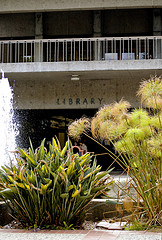
|
CSU East Bay LIbrary
©
Ned Fielden
|
Twenty some Northern California academic librarians descended on the wood-paneled Biella room in the library at CSU East Bay on Friday, February 25th for their annual regional meeting. While snow at sea level had been forecast, which fortunately (or unfortunately, depending on one's perspective) did not appear, the crew settled in to a welcome from University Librarian Linda Dobb and CARL VP North Kathlene Hanson. Introductions alone took over an hour, and as is often the case, the various librarian biographies and concerns formed a broad and intriguing continuum. The values and mission of librarianship have traditionally attracted individuals from a wide array of former careers and interests. President Ned Fielden outlined CARL's just-launched mentoring program, which has generated considerable interest amongst new librarians, and noted the importance for the profession to renew itself through the fresh energy that comes with new hires. Discussions during the day ranged from library building design, to instructional practices, mobile technologies, collection development, and specifically CARL matters such as ways to invigorate Interest Groups and news on the 2012 conference. Besides librarians from a group of CSU campuses including East Bay, San Francisco, Maritime Academy, Monterey Bay and Stanislaus, and local community colleges, there were several representatives from private universities. A pile of attendees were recent library school graduates. Two lucky raffle winners came away with free one year memberships in CARL, and the group disbanded in mid-afternoon, accompanied with the energy that is generated by frank discussion, a number of questions and themes to ponder back home, and a handful of new friends.
Submitted by CARL President Ned Fielden |
Interest Group News
On January 7, the Southern California Instruction Librarians Interest Group (SCIL) hosted another exciting SCIL Works program called “Keeping it Real, Keeping it New: Pushing Boundaries in Challenging Times” at National University in San Diego. Speakers and presenters focused on how teaching librarians can remain energetic and engaged in a sometimes frustrating teaching setting, and how challenging the boundaries created by tradition can actually push them to innovate, create, and stay fresh.
The 40+ attendees were able to attend 2 of the 3 presentations which focused on practical methods to not only “liven up” library instruction, but also how to make the instruction more effective. These presentations included: “Pushing Boundaries: Convincing Yourself to Let Go” (Kelly Myer Polacek), “Use of Moodle (LMS) Discussion Forums to Increase Student Engagement with Information Literacy” (Michelle Van Hoeck), and “Let’s be Direct about Assessment: Making the Leap from Indirect Data to Direct Evidence of Student Learning” (Henri Mondschein).
New to SCIL Works was the addition of “lightning rounds,” which were short, 5 minute presentations given by librarians on a number of topics. This format turned out to be very successful, with most attendees gaining a lot from the quick overviews of multiple subjects. Presenters mainly focused on how to stay fresh and motivated in their jobs, whether it be through leveraging technologies as a way to engage students, by more actively participating in their campus communities, or by providing unique classroom activities (such as slam poetry and yoga exercises) to alleviate student anxieties.
Abstracts of the presentations can be found on the SCIL website at: http://www.carl-acrl.org/ig/scil/scilworks/2011/abstracts.pdf.
Submitted by Talitha Matlin, Assistant Librarian, San Diego Zoo
SEAL-S will continue with our Spring Adventure tradition by having an outing at the Cabrillo Marine Aquarium in San Pedro on Saturday, April 30th. Details and online registration announcement will be posted on the SEAL-S page soon.
Here's the link to Cabrillo Aquarium Education Program:
http://www.cabrillomarineaquarium.org/education.asp
and SEAL-S Past Excellent Adventures:
http://www.carl-acrl.org/ig/seals/excellent.html
Submitted by Khue Duong, Science Librarian, CSU Long Beach

CARLDIG-S handouts and recordings from our December 3, 2010 Fall Program “How Do I Assess That?” are now available on our CARL Interest Group’s website.
Visit: http://www.carl-acrl.org/ig/carldigs/past-events.html.
All three of our speakers (Cynthia Johnson – UCI, Will Breitbach – CSU Fullerton, and George Romero – Cabrillo College) have graciously provided their PowerPoint slides as well as additional materials mentioned during their presentations.
In addition, there is a list of additional assessment resources to explore.
Finally, we invite all CARL members to watch the program in the comfort of their offices and homes. The program is broken up into two (2) 1 hour and 34 minute recordings and are available courtesy of the Loyola Marymount University and the William H. Hannon Library.
Viewing tips: Allow the records to fully load before watching in order to take advantage of the DVD-like controls. E.g., pause, fast-forward, rewind, etc.
Submitted by Michael Yonezawa on behalf of the CARLDIG-S Steering Committee
|
|
CARL Awards
The CARL Research Award Committee is excited to announce the winners of this year’s CARL Research Award: Matthew Conner and Melissa Browne. These CARL members submitted a team proposal entitled “Information Visualization and Keyword Searching.” Both team members work at Peter J. Shields Library, University of California, Davis.
The objective of the research is to learn if using information visualization tools to generate keywords will result in better search terms and more efficient searches. To accomplish this the applicants propose to observe/record students as they use 4 different methods of generating keywords:
- A matrix that subjects fill in by hand by generating keywords of varying specificity for a given topic
- The Google Wonder Wheel, which generates terms related to an inputted term and displays them in a scheme suggestive of concept mapping,”
- EBSCO’s Visual Search feature in the Academic Search Complete database
- A control method, where students search on their own with no outside method for generating keywords.
The team has been awarded $800 to complete their research, and we look forward to hearing back from the winning team in one year for a report on their findings. Melissa and Matthew will give a presentation on their research to the CARL membership at the 2012 CARL Conference in San Diego. Congratulations to all the applicants for a great round of research proposals and especially to our award winners!
Respectfully,
The CARL Research Award Committee
Alexandra Chappell, Chair, Claremont Colleges
Stacy Russo, Chapman University
Aline Soules, California State University, East Bay
Carol Spector, University of San Francisco
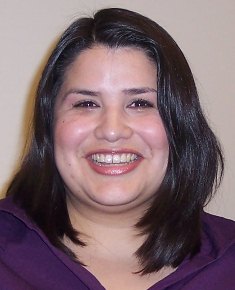
|
Susan Trujillo |
Susan Trujillo is currently an MLIS student at San Jose State University, California and also a Library Assistant IV at the University of California, Riverside. She started the program in the spring 2010 semester and she is focusing on reference and instruction coursework. Susan graduated from the University of California, Riverside in December of 2009 with a bachelor’s of Science in Business Administration. She will receive $1000 toward travel to Philadelphia, PA to attend The ACRL 2011 conference themed, "A Declaration of Interdependence, " from March 30-April 2, 2011.
The Ilene F. Rockman award is given annually in honor and memory of outstanding CARL member, information literacy leader, and respected research Ilene F. Rockman. Funds for the scholarship come from CARL members and individual donations to the organization.
|
|
People News
Locke Morrisey, Head of Collections, Reference & Research at University of San Francisco’s Gleeson Library and CARL Outstanding Member Award winner in 2008, passed away December 14, 2010. Many people around the country have shared their testimonials and remembrances on the Gleeson Library Blog at: http://gleesongleanings.wordpress.com/2010/12/14/locke-morrisey/. Additionally, an obituary has been published in the Marin Independent Journal (marinij.com): http://tiny.cc/a2tfu. The family held a private service in December, and Locke's Celebration of Life will be on Saturday, March 26th in Ross, CA. Please contact Al Yeh at al_yeh@yahoo.com by March 12th for further details.
Locke’s contributions to CARL were numerous and remarkable. Every year since 1992 Locke was involved with CARL’s business, planning and programs. Some lasting contributions include his leadership in creating the CARL/ACRL Scholarship in 2002, his revision of the organization’s bylaws in the 1990s, and his planning of the 7th and 11th CARL Conferences. In addition, he was an active leader in SEAL-South from 1992-1997, and served in various CARL Executive Board positions including CARL Liaison Coordinator-South (1996-1997), the ACRL Chapters Council Delegate (2000-2002), and CARL Northern Campus Liaison Coordinator & Private Institutions Director at Large (2006-2008). When nominating him for the Outstanding Member Award, former CARL president Suellen Cox wrote, “During Executive Board meetings, Locke was always a strong contributor of ideas, a thoughtful participant, and an engaged collaborator.” Locke also served ACRL both as a CARL representatitve, and as an elected councilor.
His colleagues remember him as tireless and optimistic. President Ned Fielden recalled that he was an “omnipresent and always cheerful member at conferences both at CARL and elsewhere around the nation. He possessed many of the landmark librarian values: he was smart, inquisitive, knowledgeable in multiple arenas within and outside of librarianship, had a large, expansive heart, and always seemed to have time to talk shop, demonstrating enthusiasm for others' interests and expressing goodwill indiscriminately. He was a big brother to many in the field, a sterling librarian.”
The loss of Locke Morrisey leaves a large void: in our hearts, in our lives, and in our profession.
Submitted with help from Ned Fielden, Suellen Cox, Vicki Rosen, and Mira Foster
Christy Hightower, Science & Engineering Collections Coordinator, and Christy Caldwell, Science & Engineering Librarian, from University of California, Santa Cruz have published the article "Shifting Sands: Science Researchers on Google Scholar, Web of Science, and PubMed, with Implications for Library Collections Budgets" in Issues in Science & Technology Librarianship, Fall 2010. http://www.istl.org/10-fall/refereed3.html
Ann Jacobson, Reference and Instruction Manager at Naval Postgraduate School's Dudley Knox Library, moderated the Engaging Customers and Communities track at Internet Librarian 2010, Monterey, CA.
Irene Berry has been appointed Digital Services Librarian at the Naval Postgraduate School in Monterey. She will be leading the school's effort to implement a DSpace digital repository.
Chimene Tucker joined The USC Libraries faculty on 1 February 2011 as a Reference and Instruction Librarian, with subject selector responsibilities for Communication and Journalism. Chimene received her Master's degree in Library and Information Science from San Jose State University and her Bachelor's in Women's Studies from San Diego State. Since 2006 she has served as the Film and Media, World History, and LGBT Librarian at the University of California, Santa Barbara. Chimene is the author of several articles in library science and in gender studies.
Places News
The Sacramento City College Library’s online tutorial PILOT, Path to Information Literacy Online Tutorial, was selected by the Association of College and Research Libraries for inclusion in PRIMO, Peer-Reviewed Instructional Materials Online. PRIMO is a national database of high quality instructional materials created by librarians that teach users how to find and evaluate information.
Developed by Sacramento City College librarian Sue Chen, PILOT is designed to help users acquire information literacy skills. It contains six modules. Each module in PILOT concentrates on teaching a different aspect of information literacy skills:
- Identifying Sources -- explains types of information sources that can be used to answer personal interest or research questions.
- Choosing Topics -- explains pre-searching activities.
- Finding Articles -- explains how to use periodical databases to locate articles for research.
- Searching LOIS -- explains how to use LOIS, the library catalog for LRCCD libraries.
- Using the Web -- explains how to get the most out of searching the web.
- Citing Sources -- explains citing information sources, plagiarism, and copyright.
PILOT provides open access 24/7 to all users. Please feel free to refer your colleagues and your students to the tutorial at http://pilot.scc.losrios.edu/pilot/.
The 25th annual Western Archives Institute will be held at U.C. Berkeley in Berkeley, California, July 10 – 22, 2011. This intensive, two week program provides integrated instruction in basic archival practices to individuals with a variety of backgrounds, including
- those whose jobs require a fundamental understanding of archival skills, but who have little or no previous archives education;
- those who have expanding responsibility for archival materials;
- those who are practicing archivists but have not received formal instruction
- those who demonstrate a commitment to an archival career.
Dr. David Gracy of the University of Texas at Austin School of Information will be Principal Faculty Member for a program which includes site visits and a diverse curriculum. The application deadline for the 2011 Western Archives Institute is April 1, 2011. For additional program information, see http://www.calarchivists.org/Default.aspx?pageId=704191, or contact Ellen Jarosz, SDSU, Associate Administrator, Western Archives Institute.
The University of Redlands, Armacost Library, will be hosting a traveling exhibition developed and produced by the National Library of Medicine, National Institutes of Health, titled Harry Potter's World: Renaissance Science, Magic, and Medicine. The exhibit will be open to the public from February 13th - March 26th during library hours.
For the third year in a row, Pasadena City College's Shatford Library has taken a role in Pasadena's One City, One Story event. Several events have been held on campus (discussion panels, a play based on a novel, and several professors adopted the novel for their English classes). Most significant were the authors’ campus visits where they discussed the practice of writing, the experiences of being an author, and the book. For many students, this is the first time they have met an author and had a book autographed. All of the authors have been very engaged with our students as well as very gracious to remain and visit with each student as they signed their books. This year's book is Mudbound by Hillary Jordan. For more information about Pasadena's One City, One Story, go to: http://www.cityofpasadena.net/Library/.
Screenwriter Aaron Sorkin and author Ben Mezrich, respectively, were given the 23rd annual USC Libraries Scripter Award for the film The Social Network and the book The Accidental Billionaires: The Founding of Facebook, A Tale of Sex, Money, Genius and Betrayal, upon which it was based. Film critic and historian Leonard Maltin announced the winners at the black-tie banquet February 4th.
Thanks to hard work by John Sanders, Special Collections Manager, and Cara Key, Special Collections Librarian, the Naval Postgraduate School's Dudley Knox Library dedicated a new Special Collections and Archives department in a public ceremony 14 October.

|
Exterior of the Jen-Hsun Huang
Engineering Center Pavilion.
The Library is on the 2nd floor.
|
After four years of planning, the new Engineering Library at Stanford University opened on August 9, 2010. The vision document for the new library, SEQ2 Library Vision: The Information Collaboratory informed the physical design of the new facility as well as the staffing, collection and service models. The SEQ2 in the title refers to the new Science and Engineering Quad currently under construction at Stanford. The library is named after Frederick Emmons Terman (1900-1982), former professor of electrical engineering, Dean of the Stanford School of Engineering and University Provost in recognition of his contributions to the School, the greater Stanford community and the field of radio engineering.
The new Engineering library houses the combined collections of the former Engineering Library, the Computer Science collection from the former Mathematical and Computer Sciences Library, and the former Physics Library. The new "bookless" library has stack space for 20,000 high-use books, a small collection of journals for casual reading, and special cases for the Timoshenko and Terman book collections. Technological features include a 3M RFID self-checkout and book security system for library materials, circulating e-readers (view the Library's Kindle page and Sony reader page), rolling white boards, areas for solo and team work, movable furniture, a digital bulletin board, a “gadget bar” with tethered e-readers, collaboration worktables, an information kiosk, and wireless access with lots of power and network outlets, as well as great views from the balcony and study carrels.
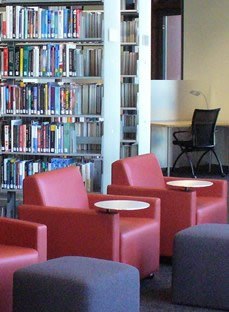
|
| Inside the Terman Library |
While the Terman Engineering Library does not have a reference desk, we do provide reference assistance using e-mail, web-based chat, text and voice on the iPhone. We also respond to walk up requests at our individual desks and referrals from the circulation desk. Information support for students and faculty is provided by four librarians using a liaison model with each of the librarians assigned to support at least two departments. As stated in the vision document for the new library, “The primary role of the librarians is to make information and knowledge accessible regardless of format.” We anticipate that more innovative information resources and devices will be available to us as we continue to evolve as a “bookless” library.
View the Picasa web album with photos of the interior of the library.
Submitted by Helen B. Josephine, Head Librarian, Terman Engineering Library, Stanford University
|
About the CARL Newsletter
The CARL Newsletter (ISSN: 1090-9982) is the official publication of the California Academic & Research Libraries organization and is published online quarterly. The RSS feed  for this newsletter is available at http://www.carl-acrl.org/newsletter/feed.xml. for this newsletter is available at http://www.carl-acrl.org/newsletter/feed.xml.
Deadlines for submissions: February 15, May 15, August 15, and November 15.
Newsletter submissions, including creative contributions, People News and Places News should be sent to carlnewsletter@gmail.com. For corrections, questions and comments contact the editor, Mira Foster (mira@sfsu.edu), J. Paul Leonard Library, San Francisco State University, 1630 Holloway Avenue, San Francisco, CA 94132.
|
|
|
 |
 |
|
 |
 |
|